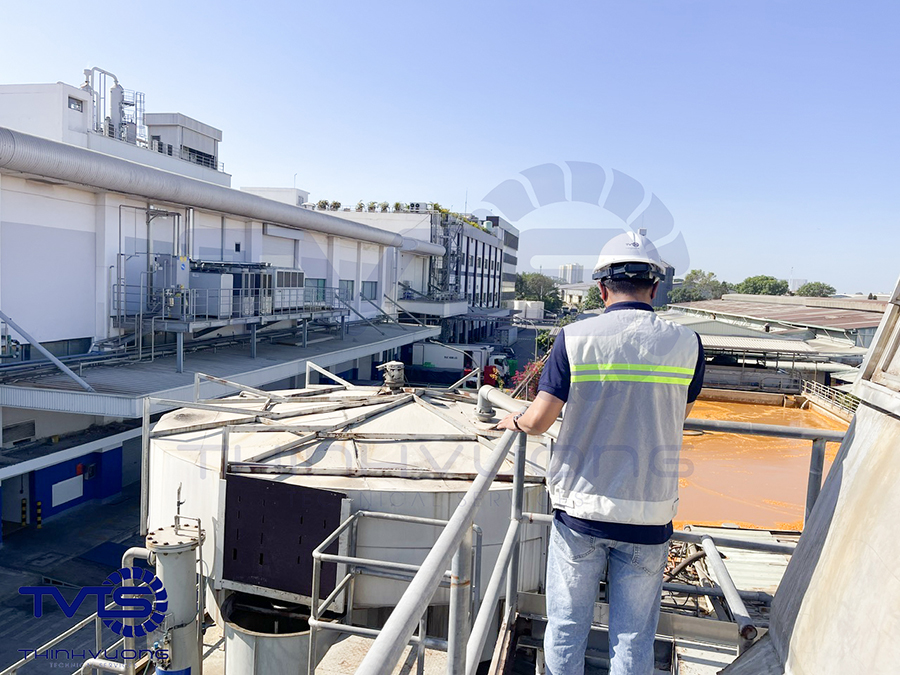In the context of businesses increasingly paying attention to environmental protection and complying with regulations on wastewater treatment. Optimizing the wastewater treatment system will contribute significantly to reducing the operating costs of the factory. TVTS will guide businesses on how to optimize the wastewater treatment system, thereby saving costs and improving operational efficiency.
Nội dung
- 1. Assess the current situation and determine goals
- 2. Applying modern technology to the processing process
- 3. Optimize operating processes
- 4. Efficient energy management helps reduce water treatment costs
- 5. Cooperate with reputable experts and suppliers
- 6. Measure and evaluate effectiveness after implementation
1. Assess the current situation and determine goals
1.1. Check the existing system
Before any improvement solutions, we need to conduct a general assessment of the current wastewater treatment system. This includes the following tasks:
- Check the performance of equipment: Identify inefficient or outdated components that waste energy.
- Evaluate the quality of the effluent: Compare with current regulatory standards. From there, identify areas for improvement.
- Analyze operating costs: Record and analyze energy, maintenance, and by-product handling costs.
1.2. Identify improvement or optimization goals
Based on the assessment results, the business needs to identify specific goals:
- Reduce energy consumption: Find energy-saving solutions.
- Improve treatment efficiency: Improve effluent quality, reduce fines for violations.
- Optimize maintenance costs: Invest in modern equipment, reduce breakdowns and downtime.

After determining the cause and the goals to be implemented. We research and select solutions to help improve the performance of the system such as:
2. Applying modern technology to the processing process
2.1. Using automation and intelligent control systems
- Integrate the automation system now. The automation system will reduce labor costs. It also improves the accuracy of wastewater treatment.
- Sensors and automatic controllers continuously monitor parameters such as pH, flow rate and pollutant concentration during system operation. Thereby automatically adjusting the treatment process effectively.
- The automation system ensures stable operation. Management software continuously monitors and analyzes data. It supports optimal decision making based on real-time information.
2.2. Investing in advanced processing technology
New treatment technologies such as membrane filtration, biotreatment and advanced oxidation can help businesses:
- Energy Savings: New systems are often more efficient. And typically consume less energy than traditional systems.
- Reduced operating costs: Advanced technology reduces processing times and limits the use of treatment chemicals. This reduces purchasing and maintenance costs.
3. Optimize operating processes
3.1. Reuse of treated wastewater
An effective solution to reduce costs is to reuse treated water:
- Application in production: If the water quality meets the standards, businesses can reuse it in production processes, wash machinery, or cool systems.
- Reduce new water costs: Reusing water not only helps protect the environment but also cuts down on the cost of buying new water.
3.2. Train staff and develop regular maintenance procedures
- Operators need to be properly and thoroughly trained.
- Regular maintenance helps to detect potential faults in the wastewater treatment system early, thereby ensuring that the equipment is always operating stably and avoiding unexpected repair costs.
- A clearly established maintenance process will improve operational efficiency.
- Investing in training and maintenance is the optimal solution for businesses.
4. Efficient energy management helps reduce water treatment costs
4.1. Use of renewable energy
To reduce energy costs, businesses should consider investing in:
- Solar energy systems: Installing solar panels helps provide electricity for wastewater treatment equipment, reducing dependence on grid power.
- Energy recovery systems: Some wastewater treatment systems can recover energy from the treatment process, converting it into electricity for reuse in the plant.
4.2. Optimize device usage
- Select energy-saving equipment: When investing or upgrading, choose equipment with high energy efficiency index.
- Measure and monitor energy consumption: Use energy monitoring systems to track, evaluate and adjust energy consumption in a timely manner.
5. Cooperate with reputable experts and suppliers
5.1. Technical advice and support
Working with experts in the field of wastewater treatment will help businesses:
- Overall assessment: Experienced experts will help businesses re-evaluate their current systems and propose appropriate improvement solutions.
- Technical support: When implementing new technologies, experts will support the installation, operation and maintenance of the system.
5.2. Choosing a quality supplier is very important in business.
- Businesses need to choose reputable suppliers to ensure that products and after-sales services meet standards. This helps improve the reliability of the system and bring peace of mind to customers.
- Some suppliers also support flexible payment methods, helping businesses easily manage their finances. In addition, many suppliers provide equipment leasing services. To reduce the initial financial pressure for businesses.
TVTS is identified as: “unit has Competent in consulting, designing, constructing, installing, operating, and transferring technology for water and wastewater treatment systems.” According to TNMT Newspaper
6. Measure and evaluate effectiveness after implementation
6.1. Setting up a monitoring system
- Measure treatment efficiency: Establish indicators to measure wastewater treatment efficiency such as flow rate, pollutant concentration, and energy consumption.
- Data analysis: Use management software to collect and analyze data. Provide timely adjustment measures.
6.2. Reporting and adjustment
- Periodic reporting: Prepare periodic reports on wastewater treatment efficiency, operating costs and savings achieved.
- Adjust strategy: Based on the report, the business needs to regularly adjust the operating process and strategy to optimize efficiency.
After choosing the right solution to reduce water treatment costs, you should immediately implement a plan to optimize your business’s wastewater treatment system.
Reducing wastewater treatment costs helps businesses save money. This solution also protects the environment. It enhances brand reputation. The solution meets legal requirements.
Assessing the current situation and applying modern technology is a must. Optimizing processes and energy management with experts helps the water treatment system to be effective.



